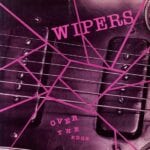CLASSIC REVIEW: WIPERS- Over the Edge
Best Tracks: Doom Town, So Young, Romeo, No One Wants an Alien
Wipers weren’t the first to fuse punk and introspection. They weren’t the first to rely on atmosphere above blunt force. And they certainly weren’t the first to rely on raw production to communicate desperation. But Wipers put all of this together in what became a necessary precursor to alternative music as we know it today. Nowhere is this more clear than on their third album, 1983’s Over The Edge: an album which bellows out a simple, singular message. Doom.
I know, I know, of the first two classic reviews I’ve pumped out, both are 80s alt-punk born out of the Northwest. But I couldn’t resist. Unfortunately, the double edged sword of being adjacent to Kurt Cobain means that while bands that otherwise would have been long forgotten have received a decent amount of a spotlight, that spotlight is still dwarfed by the shadow of Nirvana. And Greg Sage’s rotating cast punk rock trio, AKA Wipers, deserves so much more than that. In mixing the ferocity and simplicity with lo-fi, feedback driven atmosphere, Over the Edge lies bathed in an eeriness which trudges the listener into Sage’s desperate pleas. It’s a simple dread which seems to speak universally of alienation.
Wipers were, effectively, Greg Sage. Sage, a wiry native of Portland, was pretty old at 25 to form a punk band in 1977. And so, he had an edge on his younger, primal counterparts. He grew up on classic guitar heroes such as Hendrix and Clapton, and while Sage certainly wasn’t a proponent of theatrical face-melters, he understood that a guitar had the potential to convey abstract, monolithic human expressions. When first conceptualizing what would become Wipers, Sage originally planned for his band to be an exclusively studio act. Sage, notoriously self-disciplined, would record the songs and they would be subsequently self-released sans any promotion. While I’m personally glad this plan wasn’t actualized, since it probably would have inhibited the still-limited fame Wipers see today, they would admittedly be the best candidates for this treatment. Sage’s songs sound as if they’ve been pulled out of an ether; a despondent catharsis in the face of an impending doom. When they fully formulated Wipers by the late 1970s, Sage and an amorphous combination of bassists and drummers decided to release their 1980 debut Is This Real? on Park Avenue Records in an attempt to gain some semblance of a following. And it worked. Is This Real? became an instant cult hit while Wipers gained notoriety in Portland through their live shows. And with that, the American Northwest had their first punk band.
While Is This Real? offers a wholly solid introduction to Wipers’ doom punk, Over The Edge is a complete fulfillment of driving introspection. The album’s opening three songs; Over the Edge, Doom Town and So Young, are all constructed around the same four chords. But they somehow circumvent repetition. I honestly haven’t fully figured out how Sage managed to make these songs sound so different; maybe it’s the blunted bass subtly moving beneath a thin overdrive, Sage’s simple and ephemeral guitar leads, or his reverbed croon which varies from a gravely plea to a panicked shout. Romeo offers the first break from standard three-chord punk with a fuzz-coated rockabilly trudge coupled with Sage’s lyrics of absolute isolation and longing which eventually erupt into a singular screech. No One Wants An Alien is an exploration into variation in that it appears unconcerned with any motif established by the preceding cuts. Opening with a surprisingly clean guitar carrying a tidy, yet rough melody, the song churns out three minutes of new-wave which could have easily been found on an early New Order album.
Though Greg Sage likely did not know at the time how influential his choice to chimera punk rock and dread-heavy vulnerability would ultimately be, it’s impossible to omit Wipers from the canon of American alternative music. So as someone who works for a college radio station, I feel pretty obligated to recognize how crucial Wipers were in my current employment. Without Wipers, the Northwest alt-punk underground may have been horribly crippled; something which would have surely impacted the Grunge explosion which current indie rock necessitates. So to all of you DIY, baby jeans wearing kids out there: take the time to thank a Wiper.

